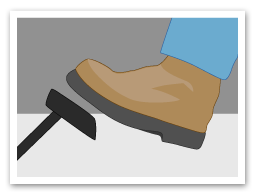What to Do If Your Brakes Fail
One of the scariest driving emergencies is brake failure. Here’s what to do if your brakes stop working.
 Covering the Brake
Covering the Brake
If your brake warning light comes on while you’re driving, get your brakes looked at immediately. This light generally indicates that the pressure on one side of the braking system is lower than the other. Your hydraulic fluid could be low or there could be a leak in your braking system. Do not drive your car in this condition.
You might be driving when you suddenly notice that the brake pedal is spongy and goes all the way to the floor when you press it. When your brakes fail, the worst thing you can do is panic. First, apply firm pressure on the brake. Most vehicles made in the last few decades have anti-lock brakes, but if your vehicle doesn't, you should pump the brakes.
If that doesn't work, shift your vehicle into a lower gear, even if you have an automatic transmission. This will help the engine slow your vehicle down for you. Then, cautiously apply your parking brake (also called the emergency brake). Do this slowly to prevent your car from spinning out. Pull off to the side of the road as soon as possible and call to have your vehicle towed. Engage your hazard lights so other vehicles know to pass you with caution.
If none of these techniques work, as a last resort you may have to find a “soft” crash area. Look for bushes or shrubs and avoid other vehicles or concrete dividers. If possible, steer uphill, as this will help slow you down. Rubbing the sides of your tires against the edge of a curb can also help slow you down.